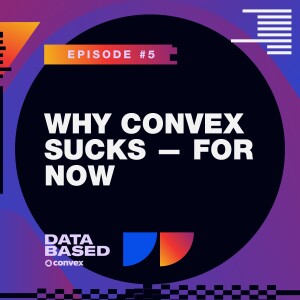
Thursday Sep 05, 2024
Why Convex Sucks — For Now
In this episode of Databased, Jamie Turner and James Cowling grapple with some bad news… they think each other’s product sucks…? Jamie and James candidly discuss the challenges and misconceptions surrounding Convex. For example, they explore the learning curve for new users, emphasizing the balance between conceptual understanding and practical application. The conversation also touches on the potential for developer lock-in and the importance of building trust with users.
Jamie and James also explore the intricacies of software development and user experience, including the challenges of transparent pricing models, emphasizing the need for relatable cost estimations based on user requirements. Additionally, they highlight strategies for enhancing customer support and education, ensuring users can fully leverage the platform's capabilities. By acknowledging their product's shortcomings, they aim to foster a more transparent dialogue within the software development community.
Key Topics Discussed:
- The initial learning experience with Convex, such as the time it takes for developers to grasp new concepts and methods.
- The difference between conceptual understanding and practical application, emphasizing the importance of both in mastering Convex.
- Concerns about developer lock-in, and how specialization in Convex might affect career mobility and skill transferability.
- The significance of opinionated frameworks that guide users, helping them make informed decisions while enhancing productivity.
- The balance between providing flexible tools and maintaining structured guidelines to support users as their projects evolve.
- The necessity of clear pricing structures, allowing users to estimate costs based on their specific application needs and user growth.
- The importance of robust customer support, ensuring users can navigate the platform effectively and maximize its benefits.
- The critical role of indexing in database management, emphasizing the need for efficient queries to optimize performance.
- The value of case studies to illustrate real-world applications and challenges, making technical concepts more relatable to users.
- The importance of educating users on writing efficient SQL queries, helping them avoid performance pitfalls in their applications.
- Implementing feedback forms to gather user insights and critiques, fostering continuous improvement of the platform based on user experiences.
- Incorporating positive affirmations and recognition within the development process to motivate teams and enhance productivity.
No comments yet. Be the first to say something!